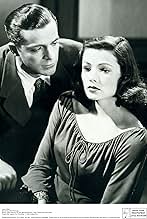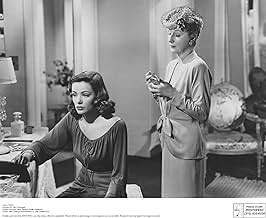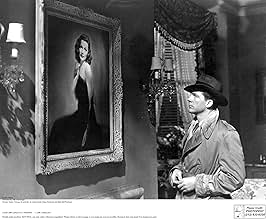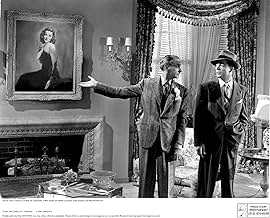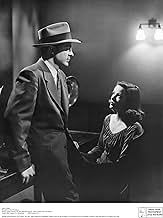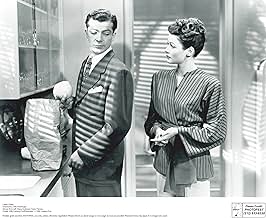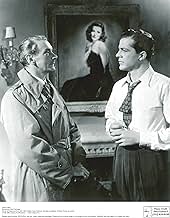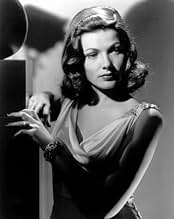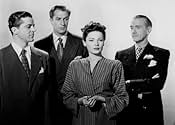ÉVALUATION IMDb
7,9/10
53 k
MA NOTE
Un inspecteur de police tombe amoureux de la femme dont il enquête le meurtre.Un inspecteur de police tombe amoureux de la femme dont il enquête le meurtre.Un inspecteur de police tombe amoureux de la femme dont il enquête le meurtre.
- A remporté 1 oscar
- 5 victoires et 4 nominations au total
Grant Mitchell
- Lancaster Corey
- (scenes deleted)
Dorothy Adams
- Bessie Clary, Laura's Maid
- (uncredited)
Terry Adams
- Woman
- (uncredited)
John Alban
- Executive
- (uncredited)
Wally Albright
- Newsboy
- (uncredited)
Bobby Barber
- Newsboy
- (uncredited)
Edward Biby
- Party Guest
- (uncredited)
Gary Breckner
- Narrator
- (uncredited)
James Carlisle
- Party Guest
- (uncredited)
Harry Carter
- Party Guest
- (uncredited)
Lane Chandler
- Detective
- (uncredited)
Bill Chaney
- Newsboy
- (uncredited)
Dorothy Christy
- Woman
- (uncredited)
Histoire
Le saviez-vous
- AnecdotesAccording to Producer and Director Otto Preminger, he had to work to win the respect of the cast, who all seemed "hostile" to him when he took over, with the exception of Clifton Webb. "I learned later", he said, "that Mamoulian had called each of them individually and warned them that I did not like their acting and intended to fire them." It was not true. Dame Judith Anderson decided to confront him on the set. She said that if he wasn't happy with her performance, then he should show her how to make it better.
- GaffesIn the initial long-shot when McPherson and Lydecker are out to dinner, McPherson's chair is unoccupied (about 15:28). When the camera is at their table, McPherson has materialized.
- Citations
Waldo Lydecker: I don't use a pen. I write with a goose quill dipped in venom.
- Autres versionsA scene cut from the theatrical version after its initial release was restored to the film in 1990. In it, Waldo Lydecker described how he transformed Laura's appearance and introduced her to high society. The studio worried that this obsession with decadent luxury would be offensive to WWII soldiers serving overseas, so the scene was deleted.
- ConnexionsFeatured in Vicki (1953)
Commentaire en vedette
I'm not sure if "Laura" truly qualifies as a film noir, although it certainly looks the part. If anything, it is a bridge between the standard romantic dramas of the '30s and '40s and the far darker truly noir films, such as "Double Indemnity," in which the main characters are either weak, desperate, or truly evil.
Tierney, here, is luminous as always, but hardly unsympathetic. And Andrews is your basic Dick Tracy -- colorless, but solid and honest. It's no surprise then that Webb walks off with the film, but his character is significant in other ways. Outwardly fey, Waldo is a variation on the stock "gay" Hollywood character seen at a time when homosexuality was hinted at but never really acknowledged. He insists he loves Laura, but there appears to be no actual love affair. He chooses her clothes and hairstyles, shows her off on his arm, but never seems to have any real physical contact with her. (The visual clue is his apartment, filled with pretty things that no one is allowed to touch, although Waldo will gladly tell you how expensive they are.) His scenes with Andrews become far more complex in this context, particularly when he discusses the case with the detective from his bath. Their verbal sparring continues throughout the film, and Webb makes frequent remarks about why women find Andrews' type so alluring, while they reject more "refined" males of taste and breeding. But Webb's Waldo, despite the refinement, is a catty and cruel little monster, a man who writes of love, but has none in his life. Unlike David Wayne's comic sissy in "Adam's Rib," who repeatedly proclaims his love and adoration for Katharine Hepburn's Amanda, Webb's Waldo has an edge so vile that we fear him, and, because of that, can accept him as a suspect.
The film is also notable for Vincent Price's performance as a needy boy-toy who is manlier than Webb, but still sexually vague, indecisive and weak. Viewers unaccustomed to seeing Price in such roles may think he was miscast. Perhaps he was, but he seems to be doing precisely what he was supposed to do, giving Laura another worldly but inappropriate suitor.
The plot, predictable or not, is great fun; a bit of a whodunit with a psychological edge. The score is legendary, and like the painting Andrews falls in love with, the music gives the film its haunting quality, particularly at those moments when we segue into another flashback.
There's a bit of inscrutability in most of Tierney's performances, which makes her perfect for this role. We rarely know what she's thinking, or precisely how she feels about the other characters. And because of this, her flashbacks provide few clues as to why anyone would want to murder her.
There are a few other suspects, of course, including the great Judith Anderson, and there's even a smart little cocktail party where you can look them over one more time. As for who really did kill Laura -- well, good luck with that one.
Tierney, here, is luminous as always, but hardly unsympathetic. And Andrews is your basic Dick Tracy -- colorless, but solid and honest. It's no surprise then that Webb walks off with the film, but his character is significant in other ways. Outwardly fey, Waldo is a variation on the stock "gay" Hollywood character seen at a time when homosexuality was hinted at but never really acknowledged. He insists he loves Laura, but there appears to be no actual love affair. He chooses her clothes and hairstyles, shows her off on his arm, but never seems to have any real physical contact with her. (The visual clue is his apartment, filled with pretty things that no one is allowed to touch, although Waldo will gladly tell you how expensive they are.) His scenes with Andrews become far more complex in this context, particularly when he discusses the case with the detective from his bath. Their verbal sparring continues throughout the film, and Webb makes frequent remarks about why women find Andrews' type so alluring, while they reject more "refined" males of taste and breeding. But Webb's Waldo, despite the refinement, is a catty and cruel little monster, a man who writes of love, but has none in his life. Unlike David Wayne's comic sissy in "Adam's Rib," who repeatedly proclaims his love and adoration for Katharine Hepburn's Amanda, Webb's Waldo has an edge so vile that we fear him, and, because of that, can accept him as a suspect.
The film is also notable for Vincent Price's performance as a needy boy-toy who is manlier than Webb, but still sexually vague, indecisive and weak. Viewers unaccustomed to seeing Price in such roles may think he was miscast. Perhaps he was, but he seems to be doing precisely what he was supposed to do, giving Laura another worldly but inappropriate suitor.
The plot, predictable or not, is great fun; a bit of a whodunit with a psychological edge. The score is legendary, and like the painting Andrews falls in love with, the music gives the film its haunting quality, particularly at those moments when we segue into another flashback.
There's a bit of inscrutability in most of Tierney's performances, which makes her perfect for this role. We rarely know what she's thinking, or precisely how she feels about the other characters. And because of this, her flashbacks provide few clues as to why anyone would want to murder her.
There are a few other suspects, of course, including the great Judith Anderson, and there's even a smart little cocktail party where you can look them over one more time. As for who really did kill Laura -- well, good luck with that one.
- billerv
- 20 janv. 2006
- Lien permanent
Meilleurs choix
Connectez-vous pour évaluer et surveiller les recommandations personnalisées
Détails
Box-office
- Budget
- 1 020 000 $ US (estimation)
- Brut – à l'échelle mondiale
- 151 $ US
- Durée1 heure 28 minutes
- Couleur
- Rapport de forme
- 1.37 : 1
Contribuer à cette page
Suggérer une modification ou ajouter du contenu manquant



